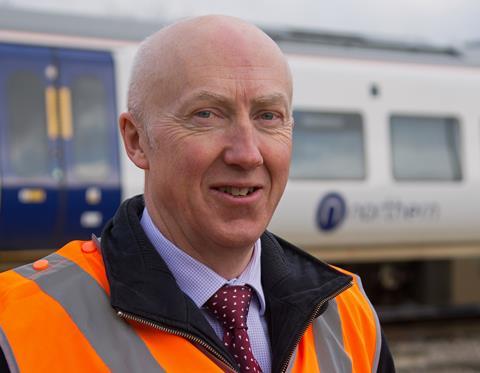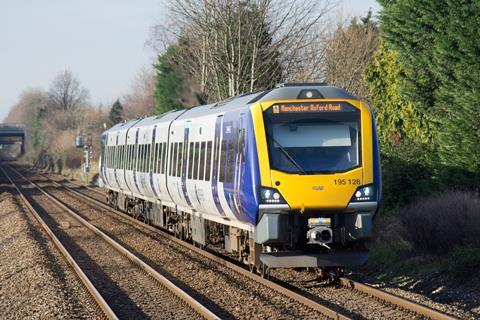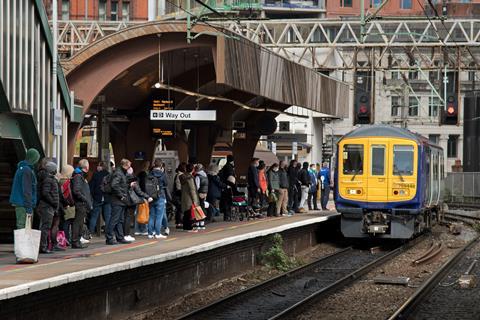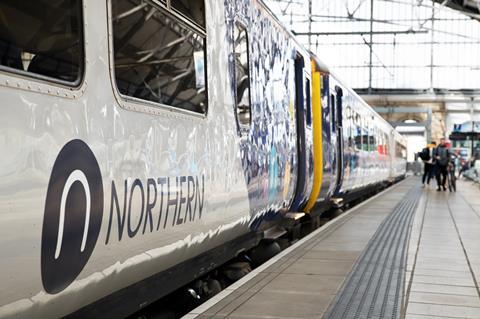UK: Northern Trains Managing Director Nick Donovan tells Rail Business UK that he is worried about passengers losing trust in the rail network, although the regional operator is seeing a faster recovery in ridership than in many other parts of the country.

‘I am very worried about the railway, about people coming back to it and then their trust in it being damaged’ by current industrial action, says Northern Trains Managing Director Nick Donovan.
‘This is especially important in the north of England, where the subsidy burden on government is significant. If trust in the network as a whole is eroded to the point where people find they don’t need the railway, then the economic benefits which flow from subsidised travel across the north start to get eroded and that’s a really dangerous place to be. So I’m deeply worried about that, and it really reinforces the imperative to get the dispute resolved.’
The return to rail following the pandemic has been good for Northern Trains, with passenger numbers now around 90% of pre-Covid-19 levels. Commuting is only at about 60% of the level seen before the pandemic, but the important leisure market is at around 120% and even higher on some routes.
Accelerated trends

‘Whout a shadow of a doubt there has been an acceleration of some trends that we’re already seeing in terms of people’s travel patterns’, he said. The operator recently ‘had our third best week ever for revenue, not just as Northern Trains in the DfT’s environment but as Northern Trains in its various consists over many years’, surpassed only by two previous Christmas periods.
The Northern network relies heavily on taxpayer support, and so continued growth is important to bring in as much revenue as possible to offset this.
‘Every one of our routes is subsidised; that is why the economic output from those routes is so important. The subsidy level equates to about 40 pence per passenger mile, anyone making a 10 mile journey into Manchester should say “thank you very much” to the taxpayer for their £4. That is the reality of the Northern network and that is why getting the volumes back in terms of numbers is so important.’
Donovan noted that the challenges faced by the industry in recent months, especially in the north of England, have seen users’ ‘net promoter’ scores falling. ‘That is hurting the reputation of rail in the north and it’s something that I care deeply about because without that reputation people will lose confidence and stop travelling.’
Driver shortages

Northern is among the train operating companies hit by driver shortages, and Donovan is very keen to distance the operator from some other TOCs in the region.
‘We’re one of the largest employers in the north of England, we employ about 7 000 people’, he said. ‘We are hearing a lot in the news about the performance of the railway, and driver availability sits at the heart of some of that commentary. Of course drivers are leaving, because drivers have always left; we have a turnover for retirements, moving on to other operators and all the rest of it.
‘Northern is a “feeder TOC” for drivers and has always been so, but I’m confident Northern has enough drivers. We have a total driver headcount of 1 972, up from 1 665 in 2019; we’ve got 154 drivers forecast to join us next year with 167 in training. There are some drivers going to other companies, but their replacements are in our resource planning, recruitment and academy pipeline.’
Donovan also reminded Rail Business UK that he warned of a 15 to 18 month hiatus in the training pipeline as the first effects of Covid-19 were seen, and training was halted across the industry.
‘After Covid-19 we were the first to get our academy back up and running, and we have one of the biggest training pipelines of any of the operators in the country in terms of a constant feed of drivers into the system. We set out a plan, we set out the intent to recover from the training backlog caused by Covid by the end of this year, and we achieved that at the launch of the December timetable.’
Northern is also working continuously to improve route and traction knowledge. ‘It is important to acknowledge that in preparing the new timetable we have seen engagement between local trade union representatives and the management team that has been really solid and positive. We think that for the first time in a decade or more of major timetable changes, all of the rostering arrangements were agreed before the timetable went in.’
Some services are still being cancelled on the day, and Donovan pointed to very high levels of absence because of sickness which are proving difficult to manage. ‘We have increased the resource planning assumptions for a higher rate, but it has gone even beyond that. When you make a set of assumptions around the deployment of resource, and your absence levels are double what those assumptions are, that brings about some challenges.’
Fleet renewal decisions

Despite government demands to rein in costs, decisions on fleet renewal cannot be put off for too long.
‘We have a big challenge regarding fleet replacement, which is coming up to a big spike; by 2040 we need to replace about 83% of our fleet, either to meet decarbonisation arrangements, the ERTMS technology coming through or just because the 15x fleets are getting to be life-expired.
‘There is an interesting challenge ahead for what largely has to be a self-powered fleet or a fleet that can charge itself up under the electrified network.’
Looking ahead, ‘there is a big cost challenge, and you’ll see that play out in the in the news a lot. We have a challenge in terms of how we balance the books going forward in amongst DfT’s challenges. But one of the things that I’m passionate about is that we continue on the journey that we set out a couple of years ago to transform the underlying capability of what Northern does.’



